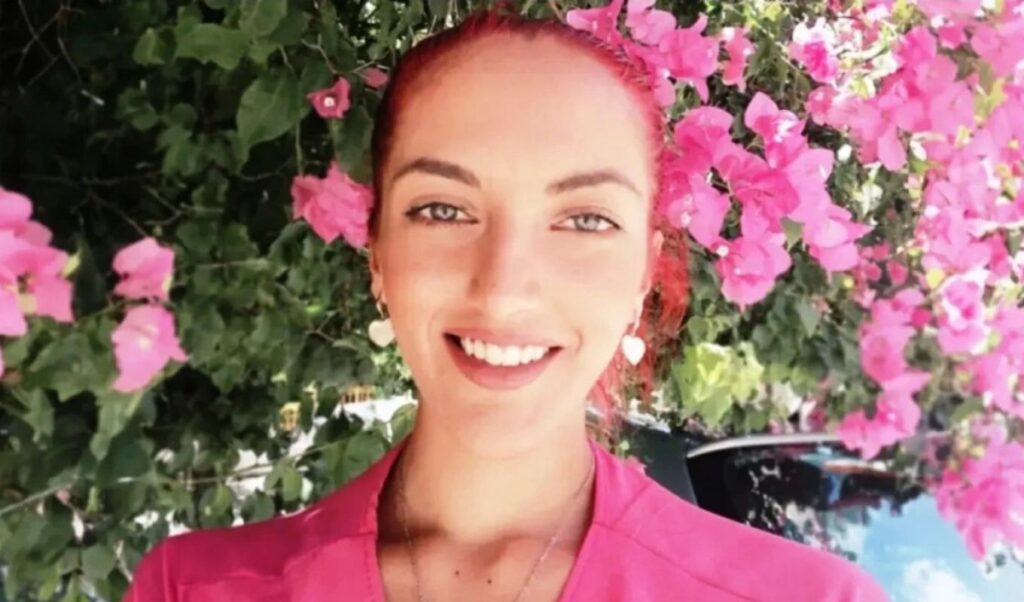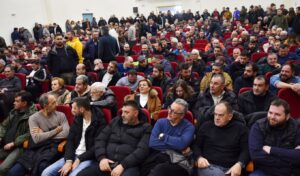Shocking testimonies describing the gradual isolation and psychological breakdown of Kyriaki Griba continued at the Mixed Jury Court in the trial for her murder by her 40-year-old former partner outside the Agioi Anargyroi Police Station. First to testify was the 28-year-old’s stepfather, who spoke of a relationship of absolute control and dependency. He characterized the accused as “very manipulative,” describing a man who constantly guided and directed the young woman. “Stand up, sit down… Didn’t his look make an impression on you? His tattoos? All of that?” he reportedly once said to Kyriaki, who despite everyone’s objections, remained with him.
The witness described how the accused didn’t work and lived on benefits, while repeatedly trying to secure a psychiatric pension. “He would tell me ‘why should I go work for 600 euros? With the benefit and allowance from home I make almost the same amount’.” As he revealed, he had visited hospital psychiatric departments to obtain documentation that would secure him permanent income, but they wouldn’t keep him, as he showed absolutely no problems. “He was cheerful, went swimming, diving, hunting,” he emphasized.
Kyriaki Griba trial: What the victim’s stepfather testified
The stepfather also described how Kyriaki, initially working at a children’s playground, quit her job because he was jealous and demanded they go together to a cleaning service. Even there, however, the accused was constantly absent. “He would tell me ‘it’s fine, 120 euros per day’. I saw him two days later and he told me the job was over,” while according to his friend who had hired him, “he only wanted beer and breaks, he was on his phone with Kyriaki all day.”
The family tried to help him find work, but without success. Meanwhile, Kyriaki was the one covering their expenses.
Answering questions, the witness clarified that he never observed substance use or psychiatric disorders. “No relation, Madam President! He simply wanted to get disability pension so he could sit around,” he emphasized.
President: “Did he have psychiatric problems? How would he get disability pension?”
Witness: “No relation, Madam President! He would go to psychiatric departments and they would turn him away. They wouldn’t keep him.”
President: “Didn’t it concern you that he claimed to have psychiatric issues?”
Witness: “No! He did everything. Swimming, diving, hunting! It never crossed my mind, not once in a million, that he wasn’t right in the head. He was always cheerful, social and nothing but polite… especially to me.”
The reconciliation that proved fatal
The stepfather also described that when Kyriaki decided to break up, she had started changing her life. “We scheduled an appointment at the Fine Arts school, she had talent in painting. But they got back together and it didn’t proceed.” This reconciliation proved fatal.
Next, Kyriaki’s sister, Alexandra, testified, outlining the same picture of isolation and abuse. “From the beginning she told me she wasn’t doing well. He spoke harshly to her, he was oppressive, but she loved him,” the witness said, explaining that he had promised her family and a better future that never came.
The sister testified that the accused gradually began answering Kyriaki’s phone calls himself and controlling every communication. “He was jealous of everyone. Me, our cousin… When she returned home, he would tell her ‘you won’t go out again’.” At the same time, she described many incidents of physical violence: blows to the face, bruises on her arms. “I told her to leave, she told me everything was under control,” she emphasized.
The witness revealed that Kyriaki was afraid to leave him permanently. “At first she loved him, toward the end she feared him,” she said characteristically. She also added that she herself avoided informing their father about the abuse, fearing his reaction.
Special emphasis was placed on describing the victim’s gradual isolation. “At work, she was constantly absent. He wanted her only for himself. In video calls he was always present, always listening,” she said, describing how even the simplest things, like a conversation with her sister, happened under the accused’s surveillance.
In response to the president’s questions, the witness emphasized that there were no psychiatric problems or substance use. “He was a person who knew very well what he was doing. Conscious and manipulative,” she said.
The prosecution support attorney referred to the possibility that the victim had developed psychological dependency. “My sister loved him very much. She was giving, as she was with all of us. It wasn’t habit to return, it was genuine feeling,” Alexandra said. When asked whether she believes the accused loved her, her answer was clear: “No. He exploited her. He was inferior to my sister and was jealous of her.”




